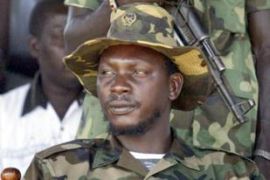Arrest warrant for DRC commander
Ally of renegade Tutsi leader Laurent Nkunda is accused of recruiting child soldiers.

Lubanga, who is due to stand trial at the ICC in the Hague, The Netherlands, on June 23, is also facing trial for recruiting child soldiers.
Along with Lubanga, two other rival Congolese leaders are in detention at the ICC, the world’s first permanent war crimes court which was set up in 2002.
Sealed warrant
The warrant against Ntaganda was issued under seal in 2006 and relates to his role as deputy chief of the military wing of UPC, which is accused of sending child soldiers to fight in Ituri district in 2002-2003.
The court said it had decided to unseal the warrant because it no longer believed it might endanger witnesses.
Ntaganda, who fought on the side of Rwandan-backed rebels when war broke out in the DRC in 1998, returned to his native province of North Kivu in 2006, where he joined Nkunda’s National Congress for the Defence of the People (CNDP).
 |
Moreno-Ocampo’s office said there were credible reports that say the CNDP was involved in “sexual crimes of unspeakable cruelty”.
“If Laurent Nkunda is truly committed to the Goma peace agreement, then he should immediately deliver Ntaganda to the international court,” Anneke Van Woudenberg, a senior researcher with New York-based Human Rights Watch, said in a statement.
But Rene Abandi, a CNDP spokesman, said the ICC’s decision to indict Ntaganda is “counter-productive”.
“Justice exists for the betterment and construction of society, not its destruction,” Abandi said.
The prosecution said it expected more applications for arrest warrants relating to its investigation into crimes committed in the Kivu region and into the funding behind the fighting.
Faltering pact
Three months ago the DRC government signed a peace deal with rebel groups in the east.
But humanitarian workers say a lack of security is still hampering their efforts to help thousands of displaced people.
The conflict in the eastern province has continued long after the official end of a 1998-2003 war.
The fighting pits Congolese Tutsi fighters against Rwandan Hutu FDLR fighters and also involves the army and other resistance groups.
The roots of the conflict lie in the 1994 Rwandan genocide in which Hutu fighters killed about 800,000 Tutsis and moderate Hutus.